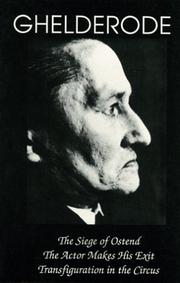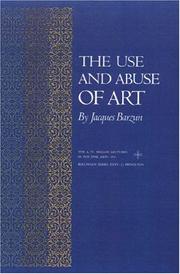| Listing 1 - 7 of 7 |
Sort by
|
Book
Year: 1932 Publisher: Paris Mercure de France
Abstract | Keywords | Export | Availability | Bookmark
 Loading...
Loading...Choose an application
- Reference Manager
- EndNote
- RefWorks (Direct export to RefWorks)
Ubu Roi --- Jarry, Alfred
Book
Year: 1989 Publisher: s. l. Temps mêlés
Abstract | Keywords | Export | Availability | Bookmark
 Loading...
Loading...Choose an application
- Reference Manager
- EndNote
- RefWorks (Direct export to RefWorks)
Marionnettes --- Littérature française --- Ubu Roi --- Jarry, Alfred

ISBN: 0924047038 9780924047039 Year: 1990 Publisher: Austin, Texas : Host,
Abstract | Keywords | Export | Availability | Bookmark
 Loading...
Loading...Choose an application
- Reference Manager
- EndNote
- RefWorks (Direct export to RefWorks)
American drama --- American drama. --- Théâtre américain --- 1900-1999. --- Le Siège d'Ostende --- Sortie de l'acteur --- Ubu Roi --- Jarry, Alfred --- Ensor, James --- Ghelderode, Michel de
Dissertation
Abstract | Keywords | Export | Availability | Bookmark
 Loading...
Loading...Choose an application
- Reference Manager
- EndNote
- RefWorks (Direct export to RefWorks)
Doelstellingen: In deze studie wordt onderzocht hoe de groteske en absurde taal in Ubu Roi (1896) van Alfred Jarry (1873-1907) vertaald wordt in een andere context. Hiervoor baseren we ons op de vertaling van de Nederlander Dolf Verspoor, getiteld Uburleske (1964) en op de vertaling van de Belg Pjeroo Roobjee, getiteld Ubu Koning (1987). Middelen of methode: Aan de ene kant bestuderen we ons werk vanuit de sociologische invalshoek van de vertaalwetenschap. We onderzoeken hoe een theaterstuk dat in de 19de eeuw een schandaal veroorzaakte, ontvangen werd door het publiek van de 20ste eeuw in Nederland en in België. Aan de andere kant bestuderen we ons werk vanuit de literaire en linguïstische invalshoek van de vertaalwetenschap. Aan de hand van verschillende casestudy's over het vertalen van theaterstukken, gaan we na welke strategieën de vertalers gekozen hebben om het taalgebruik van Jarry te vertalen. In het bijzonder richten we ons op de eigennamen, het dialect, de archaïsmen, de woordspelingen, de neologismen en de culturele referenties die voorkomen in Ubu Roi. Resultaten: Het resultaat toont aan dat de vertaling van Verspoor, professioneel vertaler, dichter bij het origineel ligt, terwijl Roobjee, als artistieke duizendpoot, meer vrijheid neemt met de oorspronkelijke tekst. Terwijl Verspoor het groteske taalgebruik van Jarry over het algemeen vertaalt naar het standaard Nederlands, doet Roobjee veel meer een beroep op het absurde taalgebruik dan de oorspronkelijke auteur. Hoe speelser het taalgebruik is in een tekst, hoe meer vrijheid de vertalers hebben en hoe meer de vertalingen van elkaar verschillen.
Alfred Jarry. --- Dolf Verspoor. --- H330-dramaturgie. --- H365-vertaalwetenschappen. --- H460-franse-taal-en-letterkunde. --- Linguïstiek: groteske en absurde taal. --- Pjeroo Roobjee. --- Receptie van Ubu Roi in België. --- Receptie van Ubu Roi in Nederland. --- Theorie over het vertalen van theaterteksten. --- Vertaalkundige studie – Onderzoek van vertalingen – schriftelijke taal. --- Vertaling van toneel.
Book
ISBN: 9782754104388 2754104380 Year: 2009 Publisher: Paris: Hazan,
Abstract | Keywords | Export | Availability | Bookmark
 Loading...
Loading...Choose an application
- Reference Manager
- EndNote
- RefWorks (Direct export to RefWorks)
Joan Miró (1893-1983) figure incontournable du surréalisme et de l’art moderne, appréciait particulièrement le poète et romancier Alfred Jarry (1873-1907), pour son génie verbal, son humour subversif et ses personnages burlesques. En 1888, Jarry invente le personnage d’Ubu. Pour Miró, cette figure monstrueuse est un triste écho de la réalité du régime franquiste espagnol. Illustrer Ubu sera pour Miró un véritable moyen de prendre position sur un mode satirique et ironique, pour dénoncer la naissance et la folie d’un monstre incontrôlable. L’exposition présente une centaine de pièces consacrées à Ubu, réalisées par Miró et pour certaines éditées par son ami critique d’art et éditeur Tiriade (1897-1983). Elle croise les livres illustrés, la gravure, la calligraphie, la sculpture, le théâtre et son décor et costumes peints par Miró, le jeu d’acteurs, des photographies et des films sur Miró et Ubu. C’est également l’occasion pour le musée départemental Matisse de mettre en valeur un nouveau pan de la donation Alice Tériade : les livres de peintres et la céramique Ubu.
Ubu (Fictitious character) in art --- Ubu (Personnage fictif) dans l'art --- Exhibitions. --- Expositions --- Miró, Joan, --- Jarry, Alfred, --- Tériade, E. --- Illustrations --- Miró, Joan --- Jarry, Alfred --- Tériade --- Miro, Joan --- Miró, Joan, --- Tériade, E. --- Ubu (Fictitious character) in art - Exhibitions --- Miró, Joan, - 1893-1983 - Exhibitions --- Jarry, Alfred, - 1873-1907 - Ubu roi - Illustrations - Exhibitions --- Miró, Joan. --- Jarry, Alfred. --- Miró, Joan, - 1893-1983 --- Jarry, Alfred, - 1873-1907 - Ubu roi
Book
Year: 1958 Publisher: Paris Librairie des bibliophiles
Abstract | Keywords | Export | Availability | Bookmark
 Loading...
Loading...Choose an application
- Reference Manager
- EndNote
- RefWorks (Direct export to RefWorks)
Théâtre des Bouffes-Parisiens (Paris) --- Cinéma --- Théâtre --- Cirques --- Théâtre de l’Union Française --- Théâtre de papier --- Dom Juan --- Nina --- Phi-Phi --- En plein air --- Congo belge --- Les frères Karamazov --- Ubu-roi --- Les Chaises --- Cabarets --- Hiroshima mon amour --- Enseignement --- Subventions --- France --- Les Possédés --- Henry IV --- La Cantatrice chauve --- Littérature --- Daphnis et Thaïs --- On ne badine pas avec l'amour --- Festival, --- Pirandello, Luigi --- Ionesco, Eugène --- Chagall, Marc --- Maïakovsky, Vladimir Vladimirovitch --- Théâtre national populaire, (Paris) --- Bérard, Christian --- Pitoeff, Georges --- Genet, Jean --- Dostoïevski, Fédor Mikaïlovitch --- Camus, Albert --- Jarry, Alfred --- Shakespeare, William --- Varte, Rosy --- Devos, Raymond --- Vaillant, Roger --- Tchekhov, Anton Pavlovitch --- Resnais, Alain

ISBN: 0691018049 0691099030 0691216339 9780691099033 Year: 1974 Volume: 22 35 Publisher: Princeton (N.J.) : Princeton university press,
Abstract | Keywords | Export | Availability | Bookmark
 Loading...
Loading...Choose an application
- Reference Manager
- EndNote
- RefWorks (Direct export to RefWorks)
The lecturer traces the historical development of attitudes toward the arts over the past 150 years, suggesting that the present is a period of cultural liquidation, nothing less than the ending of the modern age that began with the Renaissance.
Arts and religion --- Arts and society --- Arts, Modern --- Arts --- Arts and sociology --- Society and the arts --- Sociology and the arts --- Religion and the arts --- Religion --- Social aspects --- Religious aspects --- Sociology of religion --- Art --- Sociology of culture --- anno 1900-1999 --- Arts and society. --- Arts and religion. --- Arts et société --- Aspect religieux --- Arts, Modern. --- Histoire. --- Arts, Fine --- Arts, Occidental --- Arts, Western --- Fine arts --- Humanities --- Modern arts --- Abuse of Art. --- Drang nach Künsten. --- Honestly. --- Life of Beethoven. --- Mademoiselle de Maupin. --- Nietzsche. --- Paradise Lost. --- Pays du Mufle. --- Peau de chagrin. --- Poésies. --- Realpolitik. --- Sacre du Printemps. --- Stones of Venice. --- The Waste Land. --- Ubu Roi. --- View of Toledo. --- War and Peace. --- aristoi. --- art criticism. --- cultural criticism. --- detached. --- difficulties. --- grands bourgeois. --- imagine realities. --- infâme. --- insaisissable. --- naturally. --- practical. --- thrilled. --- Arts, Primitive --- Arts, Modern - 20th century
| Listing 1 - 7 of 7 |
Sort by
|

 Search
Search Feedback
Feedback About UniCat
About UniCat  Help
Help News
News